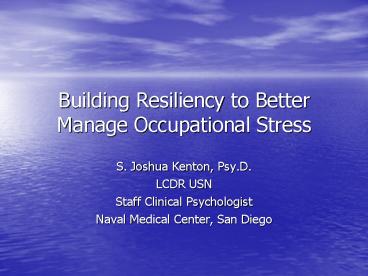Building Resiliency to Better Manage Occupational Stress - PowerPoint PPT Presentation
1 / 14
Title:
Building Resiliency to Better Manage Occupational Stress
Description:
Building Resiliency to Better Manage Occupational Stress S. Joshua Kenton, Psy.D. LCDR USN Staff Clinical Psychologist Naval Medical Center, San Diego – PowerPoint PPT presentation
Number of Views:195
Avg rating:3.0/5.0
Title: Building Resiliency to Better Manage Occupational Stress
1
Building Resiliency to Better Manage Occupational
Stress
- S. Joshua Kenton, Psy.D.
- LCDR USN
- Staff Clinical Psychologist
- Naval Medical Center, San Diego
2
Work Related Stress
- Unreasonable demands for performance
- Lack of interpersonal communication between the
employer and the employees - Lack of interpersonal relationship among the
employees - The fear of losing one's job/job insecurity
- Long working hours
- Less time to spend with the family
- Under utilization of skills
3
Psychological Symptoms
- Mood swings
- Anxiety
- Depression
- Irritability
- Poor decision making
- Lack of concentration
4
Physical Symptoms
- Suppression of immunity resulting in infection
- Headaches
- Increased appetite leading to weight gain.
- Sleeplessness
- Loss of sexual drive
- Memory disturbances
5
Behaviors you may display
- Change in friends
- Withdrawal
- Changes in appetite
- Inability to rest
- Pacing
- Change in sexual functioning
- Increased Alcohol consumption
- Emotional outbursts
- Erratic movements
- Change in speech patterns
6
Stress Injury Sources
Intense or Prolonged Stress
Impact
- A trauma injury
- Due to events provoking terror, helplessness,
horror, shock
7
Stress Injury Sources
Common Examples in Healthcare Setting
Impact
- ER Trauma Care
- Psychiatric Emergencies Response
- ICU, NICU, etc
8
HEALTHY
READY
GREEN ZONE
- Fit Focused
- Well-trained and qualified
- Positive command climate
- High morale
- Strong cohesion
- Good order and discipline
- Clear sense of mission
- Exhibits ethical and moral
- behavior
- Balanced healthy relationships
9
RECOGNIZING STRESS REACTION
YELLOW ZONE
REACTING
- Anxious, irritable, sad
- Poor concentration
- Trouble sleeping, fatigued
- Changes in appetite
- Apathy, loss of interest
- Negative, pessimistic
- Increased interpersonal
- conflict
- Poor decision-making
10
RECOGNIZING STRESS INJURY
ORANGE ZONE
INJURED
- Poor emotional control
- Major sleep difficulties
- Guilt, shame, fear
- Loss of interest
- Disruption of moral values
- Substance Abuse
- Decreased confidence
- Poor morale
- Family disruption
11
RECOGNIZING STRESS ILLNESS
RED ZONE
ILL
- Chronic and severe distress
- Substance dependence
- Major disruptions of sleep, appetite, mood
- Significant problems at work
- Panic, rage, guilt, and shame
- Symptoms that persist or get worse over time
- Injuries that dont heal without help
- Family/relationship violence or abuse
12
What Doesnt Help
- Using alcohol or drugs
- Violence or conflict
- Overeating/restricting diet
- Working too much
- Blaming others
- Withdrawing from pleasant activities
13
Building, Maintaining and Restoring Your
Resiliency
- Create small goals
- Stay in the here and now
- Dont run from the problem/Keep things in
perspective - Maintain an outlook of hope
- More fun
- Rely on good relationships
- Exercise
- Breathing/Relaxation
14
Conclusion
- Managing stress takes practice
- Be preventative
- Stay in the Green/Yellow
- Look out for each other
- Know when to get professional help.































